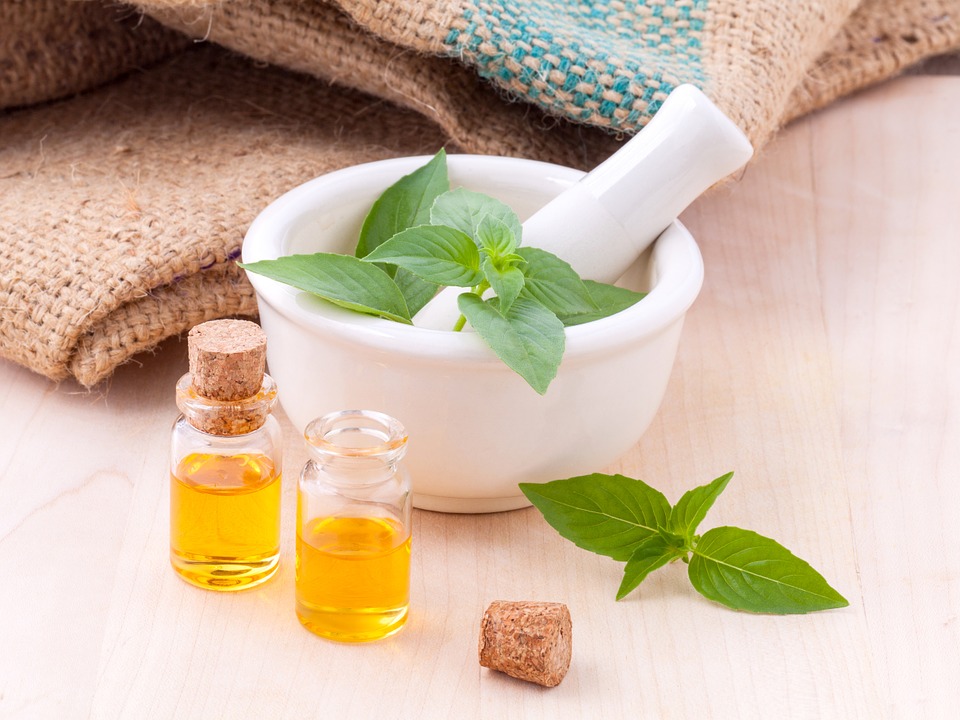Essential oils are the concentrated water-insoluble oily liquids produced naturally by plants. They are also called volatile oils since they are easily evaporated through steam distillation and usually have strong aromas. They are the compounds that gave pants their distinctive smells. The use of aromatic plants for their healing properties can be traced back as old as the Stone Age of 10,000 BC. In ancient Egypt, many types of essential oils, including anise, fennel, coriander, thyme, frankincense, and myrrh were used extensively for medical purpose, as recorded in the Egyptian papyrus [1]. Today, essential oils are used as the primary therapeutic agents in aromatherapy, a popular natural therapy for healing of the mind, body and soul [2]. Aromatherapy is also used as a supportive care for cancer patients to improve quality of life and for general well-being [3].In here, we will explore how essential oils can potentially benefit cancer patients through evidence-based research.

Anticancer Properties of Essential Oils
Many essential oils possess cancer fighting properties. In fact, there has been a resurgence of interest in the scientific studies of essential oils for their therapeutic and pharmaceutical potentials recently. Anticancer properties of essential oils are the focus of many studies, with hundreds of research papers published over the last 10 years [4]. To date, the anticancer potential of essential oils from different plants has been reported on brain, skin, leukaemia, mouth, bone, breast, cervix, colon, kidney, liver, lung, ovary, pancreas, prostate, and uterus cancers [5].
The following table shows some of the common essential oils tested with anticancer properties [4] [5]:
| Cancer | Essential oils tested |
| Brain | German Chamomile; Sweet Basil; Ginger; Apple |
| Breast | Wild Sage; Cedrelopsis grevei (Madagascar); Helichrysum; Myrtle; Rosemary; Peruvian pepper; Chinese Chen Xiang; Thyme; Angelica; Frankincense; Myrrh |
| Cervix | American Sweet Gum; Sweet Basil |
| Ovary | Lemon; Apple |
| Colon | Sweet Fern; Mugwort; Cochin Grass |
| Kidney | Cypress; Bay laurel; |
| Leukaemia | Cochin Grass; Mugwort; Apple; Basil |
| Liver | Turmeric; Lemon Thyme; Mugwort |
| Lung | Mugwort; Tridax Daisy; Apple; Thyme; Sweet Fern; |
| Mouth | Guava; Sage; Lovage |
| Pancreas | Angelica |
| Prostate | Kumquat; Rosemary; Thyme; Basil; Ginger; Frankincense; Myrrh |
| Skin | Turmeric; Cypress; Bay Laurel |
| Stomach | Black cumin |

The chemical compounds with these essential oils are found to be responsible for their anticancer effects. These compounds are mainly terpenes and terpenoids, aromatic (phenolic) components, and in a lower extent aliphatic (alkanes and alkenes) compounds [5]. The possible ways that these compounds in essential oils can help to stop cancer include preventing the proliferation of cancer cells, preventing the cancer cells from spread to other organs, and causing cancer cells to self-destruct [4]. Nevertheless, research in this area is still in the growing stage with more clinical trials required to establish the effectiveness of the use of essential oils as anticancer therapeutic agents.
Enhancing the effectiveness of cancer drugs
A frequently encountered problem in cancer treatment has been the development of resistance to the chemotherapy drugs by cancer cells, which make the used of anticancer drugs ineffective. This problem is referred to as Multidrug Resistance [6]. Several essential oils have been found to be able to help in circumventing this problem. For example [4],
- Thyme essential oil has been tested to be effective against widely used drugs like Adriamycin, Vincristine, and Cisplatin resistant ovarian cancer cell lines.
- Essential oil from the Melaleuca alternifolia plant, commonly known as tea tree oil, can improve the effectiveness of Adriamycin in skin cancer treatment.
- Linalool, a common compound in many essential oils, including Lavender, Cinnamon, Basil, and Mugwort, is reported to increase the therapeutic effect of Doxorubicin in breast cancer cells with drug resistance.
As such, some essential oils can potentially assist in enhancing the effectiveness of chemotherapy drugs.

Reducing side effects of cancer treatment
Cancer patients can suffer from many different side effects during cancer treatment. Some common side effects reported include nausea and vomiting, dry mouth or thirst, hair loss, fatigue, loss of appetite, coldness, numbness in fingers or toes, confusion, and depression [7]. The use of essential oils in aromatherapy can potentially alleviate or prevent these side-effects. Here are some of the essential oils that have been studied in clinical studies for cancer treatment induced side-effects:
- Peppermint and spearmint essential oil can be effective in overcoming chemotherapy-induced nausea and vomiting [8]
- Essential oils from the Manuka and Kanuka trees from Australia and New Zealand can be helpful in preventing mouth and digestive tract ulcers during radiotherapy [9]
- Lavender essential oil can be beneficial in reducing distress among advanced cancer patients [10]
- Application of a Eucalyptus oil blend, with its antibacterial properties, has been found to reduce ulceration in head and neck cancer patients and help to improve their quality of life [11]
There are also many studies conducted to evaluate the benefit of aromatherapy in reducing anxiety and depression among cancer patients. A systematic review of 18 clinical trials concludes that aromatherapy/essential oils may be used safely by cancer patients for a short-term benefit to reduce anxiety and depression symptoms and to increase sleep patterns and wellbeing [12].

Conclusion
Current scientific research suggests that the use of essential oils can potentially benefit cancer patients in three ways. First, many essential oils possess anticancer properties that can assist in preventing and halting cancer growth and spread; Second, some essential oils can potentially improve the effectiveness of chemotherapy drugs and prevent drug resistance by cancer cells; and third, some essential oils can help to reduce and prevent side effects experienced by cancer patients during treatment. Therefore, the use of essential oils by cancer patients as a complementary and supportive care during cancer treatment should not be discouraged. However, with the research on essential oils for cancer treatment support is still in early stage, there is still a long way to suggest that essential oils and aromatherapy can become standard therapy for cancer treatment. Hence, it is unwise and dangerous for cancer patients to rely solely on essential oils and aromatherapy as an alternative medicine for cancer.
References
[1] K.-H. Kubeczka, History and Sources of Essential Oil Research, in: K.H. Can Baser, G. Buchbauer (Eds.), Handb. Essent. Oils, Sci. Technol. Appl., 2nd ed., CRC Press/Taylor & Francis, Boca Raton, FL, 2016: pp. 5–42.
[2] B. Ali, N.A. Al-Wabel, S. Shams, A. Ahamad, S.A. Khan, F. Anwar, Essential oils used in aromatherapy: A systemic review, Asian Pac. J. Trop. Biomed. 5 (2015) 601–611. doi:10.1016/j.apjtb.2015.05.007.
[3] A. and C.T.E.B. PDQ Integrative, Alternative, and Complementary Therapies Editorial Board, Aromatherapy and Essential Oils (PDQ®): Health Professional Version, National Cancer Institute (US), 2002. http://www.ncbi.nlm.nih.gov/pubmed/26389313 (accessed July 19, 2016).
[4] N. Gautam, A.K. Mantha, S. Mittal, Essential oils and their constituents as anticancer agents: a mechanistic view., Biomed Res. Int. 2014 (2014) 154106. doi:10.1155/2014/154106.
[5] B. Bayala, I.H. Bassole, R. Scifo, C. Gnoula, L. Morel, J.-M.A. Lobaccaro, J. Simpore, Anticancer activity of essential oils and their chemical components – a review., Am. J. Cancer Res. 4 (2014) 591–607. http://www.ncbi.nlm.nih.gov/pubmed/25520854 (accessed July 14, 2016).
[6] M. Saraswathy, S. Gong, Different strategies to overcome multidrug resistance in cancer, Biotechnol. Adv. 31 (2013) 1397–1407. doi:10.1016/j.biotechadv.2013.06.004.
[7] H.K. Chan, S. Ismail, Side effects of chemotherapy among cancer patients in a Malaysian general hospital: Experiences, perceptions and informational needs from clinical pharmacists, Asian Pacific J. Cancer Prev. 15 (2014) 5305–5309. doi:10.7314/APJCP.2014.15.13.5305.
[8] Z. Tayarani-Najaran, E. Talasaz-Firoozi, R. Nasiri, N. Jalali, M. Hassanzadeh, Antiemetic activity of volatile oil from Mentha spicata and Mentha × piperita in chemotherapy-induced nausea and vomiting., Ecancermedicalscience. 7 (2013) 290. doi:10.3332/ecancer.2013.290.
[9] W. Maddocks-Jennings, J.M. Wilkinson, H.M. Cavanagh, D. Shillington, Evaluating the effects of the essential oils Leptospermum scoparium (manuka) and Kunzea ericoides (kanuka) on radiotherapy induced mucositis: A randomized, placebo controlled feasibility study, Eur. J. Oncol. Nurs. 13 (2009) 87–93. doi:10.1016/j.ejon.2009.01.002.
[10] K. Soden, K. Vincent, S. Craske, C. Lucas, S. Ashley, A randomized controlled trial of aromatherapy massage in a hospice setting., Palliat. Med. 18 (2004) 87–92. http://www.ncbi.nlm.nih.gov/pubmed/15046404 (accessed July 21, 2016).
[11] P.H. Warnke, E. Sherry, P.A.J. Russo, Y. Açil, J. Wiltfang, S. Sivananthan, M. Sprengel, J.C. Roldàn, S. Schubert, J.P. Bredee, I.N.G. Springer, Antibacterial essential oils in malodorous cancer patients: Clinical observations in 30 patients, Phytomedicine. 13 (2006) 463–467. doi:10.1016/j.phymed.2005.09.012.
[12] K. Boehm, A. Büssing, T. Ostermann, Aromatherapy as an adjuvant treatment in cancer care–a descriptive systematic review., Afr. J. Tradit. Complement. Altern. Med. 9 (2012) 503–18. http://www.ncbi.nlm.nih.gov/pubmed/23983386 (accessed July 21, 2016).